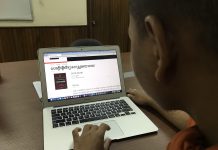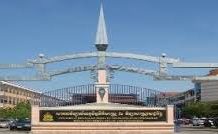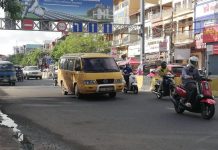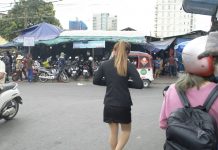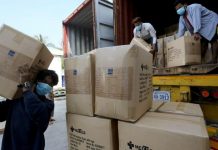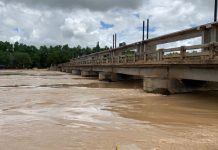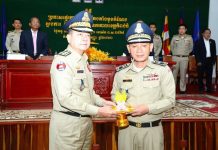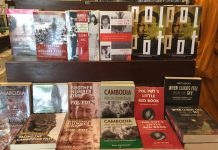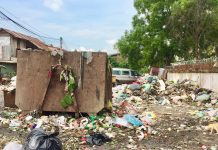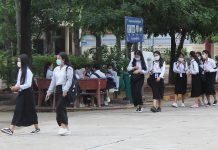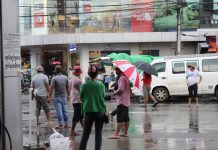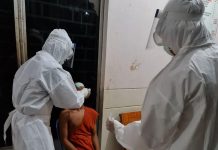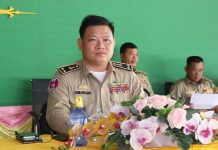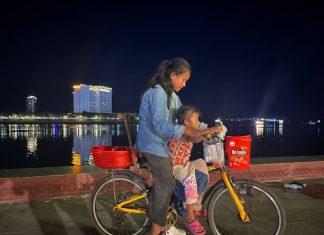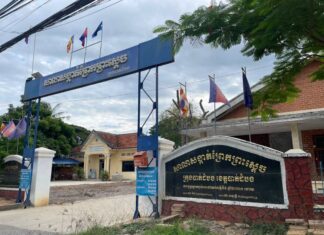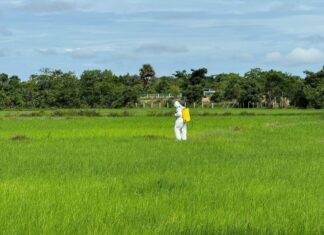ហេតុអ្វីត្រូវយល់ដឹងពីនយោបាយ?
នៅពេលនិយាយដល់ពាក្យថា «នយោបាយ» ប្រជាជនកម្ពុជាមួយចំនួនហាក់មិនសូវចង់តាមដាន មិនសូវចង់គិត និងត្រិះរិះពិចារណា នូវហេតុការណ៍ទាំងពួងដែលបានកើតឡើងក្នុងសង្គមជាតិ ជាពិសេសពាក់ព័ន្ធនឹងបញ្ហាសន្តិសុខជាតិ ការការពារជាតិ គោលនយោបាយការបរទេស និង គោលនយោបាយរូបិយវត្ថុជាដើម។
សាកលវិទ្យាល័យភូមិន្ទនីតិសាស្ត្រ និង វិទ្យាសាស្ត្រសេដ្ឋកិច្ច នឹងចូលរៀនវិញក្នុងខែវិច្ឆិកា
សាកលវិទ្យាល័យភូមិន្ទនីតិសាស្ត្រ និងវិទ្យាសាស្ត្រសេដ្ឋកិច្ច បានជូនដំណឹងដល់សាស្ត្រាចារ្យ និងនិស្សិតថ្នាក់បរិញ្ញាបត្រឆ្នាំទី២ ទី៣ និង ទី៤ គ្រប់ផ្នែកទាំងអស់ថា ការចូលរៀនឡើងវិញនឹងចាប់ផ្តើមនៅថ្ងៃទី១០ ខែវិច្ឆិកា ឆ្នាំ ២០២០ខាងមុខនេះ
ផ្សែងចេញពីម៉ាស៊ីនយានយន្តជជុះធ្វើឲ្យប៉ះពាល់ដល់សុខភាពមនុស្ស និងបរិស្ថាន
ជារៀងរាល់ថ្ងៃ គេតែងឃើញយានយន្តធ្វើចរាចរនៅតាមដងផ្លូវជាហូរហែមិនដាច់។ យានយន្តទាំងនោះមានទាំងថ្មី និងចាស់ៗ ដែលភាគច្រើនជារថយន្តជជុះ។ ម៉ាស៊ីនយានយន្តចាស់ៗ ឬយានយន្តជជុះដែលធ្វើចរាចរក្នុងប្រទេស តែងមានផ្សែងពុលធ្វើឲ្យប៉ះពាល់ដល់សុខភាពមនុស្ស និងបរិស្ថាន។
តើការរំលោភបំពានលើស្រ្ដីពិតជាបណ្ដាលមកពីកត្តាស្លៀកពាក់ ឬយ៉ាងណា?
ករណីរំលាភសេពសន្ថវៈលើស្រ្ដី និងកុមារីក្នុងសង្គមខ្មែរបច្ចុប្បន្នមានការកើនឡើងគួរឲ្យព្រួយ។ ទន្ទឹមនឹងនោះ មានការលើកឡើងថា ការស្លៀកពាក់ស៊ិចស៊ីជាមូលហេតុដែលនាំឲ្យមានការរំលោភ។
ADB ព្យាករណ៏សេដ្ឋកិច្ចធ្លាក់ចុះក្នុងរង្វង់ -៤% ឆ្នាំនេះ មុននឹងមានសន្ទុះឡើងវិញ ៥,៩% ឆ្នាំក្រោយ
ធនាគារអភិវឌ្ឍន៍អាស៊ី(ADB) បានប្រកាសកាលពីថ្ងៃទី២៣ ខែកញ្ញា ឆ្នាំ២០២០នេះថា សេដ្ឋកិច្ចកម្ពុជាសម្រាប់ឆ្នាំនេះ នឹងធ្លាក់ចុះក្នុងរង្វង់ -៤.០% មុននឹងមានសន្ទុះឡើងវិញក្នុងកម្រិត ៥.៩% នៅឆ្នាំក្រោយ
ជំនន់ទឹកភ្លៀង បង្កការខូចខាតដល់ដំណាំរាប់ពាន់ហិចតានៅខេត្តពោធិ៍សាត់
ជំនន់ទឹកភ្លៀងបានបង្កការខូចខាតដល់ដំណាំកសិកម្មជាច្រើនហិចតា ប៉ះពាល់លំនៅដ្ឋាន និងរចនាសម្ព័នមួយចំនួន ខណៈដែលប្រជាជនរាប់រយគ្រួសារ ក៏ត្រូវបានជម្លៀសចេញដើម្បីរកទីទួលសុវត្តិភាពផងដែរ នៅក្នុងខេត្តពោធិ៍សាត់។នេះបើយោងតាមរបាយការណ៏ទឹកជំនន់ ចេញដោយអាជ្ញាធរខេត្តកាលពីថ្ងៃទី២១ ខែកញ្ញា ឆ្នាំ២០២០នេះ
បុរសម្នាក់ធ្វើក្រមាពណ៌ឥន្ទធនូដើម្បីលើកកម្ពស់សិទ្ធិអ្នកស្រឡាញ់ភេទដូចគ្នា
ឈានដល់ក្នុងវ័យ៦៨ឆ្នាំហើយ ក្នុងពេលបច្ចុប្បន្ននេះ ការរើសអើងនេះនៅតែមានបន្តមកលើអ្នកស្រលាញ់ភេទដូចគ្នា លោកផេង សាញ់ ក៏បានច្នៃធ្វើក្រមាមានពណ៌ជាឥន្ទធនូ ដែលជាពណ៌តំណាងឱ្យភាពចម្រុះនៃអ្នកស្រលាញ់ភេទដូចគ្នា នៅជុំវិញពិភពលោក
ការចាក់ធុងបាសច្រៀងខារ៉ាអូខេ ធ្វើឲ្យពលរដ្ឋមួយចំនួនក្នុងសង្កាត់ចោមចៅ២ ខឹងសម្បា
ប្រជាពលរដ្ខមួយចំនួន បានត្អូញត្អែរ និងខឹងសម្បាចំពោះការចាក់បាសច្រៀងខារ៉ាអូខេតាមផ្ទះ ដែលមានសម្លេងលឺខ្លាំងៗ រំខានដល់ការរស់នៅ ការប្រកបរបរ និងការរៀនសូត្រ នៅក្នុងសង្កាត់ចោមចៅ២ ខណ្ឌពោធិ៍សែនជ័យ រាជធានីភ្នំពេញ
លោក ម៉ែន លី ឡើងស្នងការកំពង់ធំ ជំនួសស្នងការចាស់ដែលមានរឿងអាស្រូវ
លោក ម៉ែន លី បានឡើងកាន់តំណែងស្នងការខេត្តកំពង់ធំជាផ្លូវការ កាលពីថ្ងៃទី២១ ខែកញ្ញា ឆ្នាំ២០២០នេះ ជំនួសលោក អ៊ុក កុសល ដែលបានអស់តំណែងនេះ ក្រោយត្រូវបានគេរកឃើញថា បានប្រព្រឹត្តអំពើប្រទូស្តកេរខ្មាសលើមន្រ្តីជាស្រ្តីនគរបាលរបស់ខ្លួន
ហេតុអ្វីត្រូវសិក្សាប្រវត្តិសាស្ត្រ?
ពេលនិយាយពីប្រវត្តិសាស្ត្រ ទំនោរម្មណ៍របស់យុវជនកម្ពុជាសព្វថ្ងៃហាក់មិនចាប់អារម្មណ៍ មិនខ្វល់ខ្វាយ ចង់ដឹង ចង់រៀន និងចង់សិក្សាពីប្រវត្តិសាស្ត្ររបស់ជាតិខ្លួនឯងឡើយ។ ដោយមើលឃើញពីការធ្លាក់ចុះនៃការសិក្សាប្រវត្តិសាស្ត្របែបនេះហើយ ទើបអ្នកឯកទេសផ្នែកប្រវត្តិសាស្ត្រលើកឡើងថា នៅពេលដែលប្រជាជនប្រទេសមួយមិនចេះប្រវត្តិសាស្ត្ររបស់ខ្លួនឯង នោះនឹងធ្វើឲ្យមានហានិភ័យធំនាថ្ងៃអនាគត
ពលរដ្ឋរស់នៅជិតរបងវត្តទួលសង្កែ ត្អូញត្អែរពីក្លិនស្អុយដោយសារគំនរសំរាម
(ភ្នំពេញ)៖ ក្លិនស្អុយចេញពីគំនរសំរាមមានទាំងពោះវៀនជ្រូក រោមមាន់ សំណល់ប្លាស្ទិច និងកាកសំណល់ស្អុយរលួយនៅគំនរសំរាមមួយកន្លែងជាប់របងវត្តទួលសង្កែ ក្នុងភូមិទួលសង្កែ សង្កាត់ទួលសង្កែទី១ រាជធានីភ្នំពេញ បណ្តាលឲ្យប្រជាពលរដ្ឋដែលរស់នៅទីនោះ ត្អូញត្អែរពីផលប៉ះពាល់សុខភាព និងការរស់នៅប្រចាំថ្ងៃ ។
មិនត្រឹមតែគំនរសំរាមដែលភាយក្លិនស្អុយនោះទេ ប៉ុន្តែទឹកខ្មៅកខ្វក់ដែលចេញពីសំរាម បានហៀរសើមពេញផ្លូវ និងមានសត្វរុយជាច្រើនមកទំសំរាម ដែលបង្កឱ្យកន្លែងនោះមានបរិយាកាសអាប់អួរគ្រប់ពេល។
កំពុងអង្គុយលាងពងទានៅមុខផ្ទះឈើមួយ ជិតគំនរសំរាមផ្លូវរថភ្លើង ជាប់របងវត្តទួលសង្កែ រាជធានីភ្នំពេញ កញ្ញា កឹម ណារី បានប្រាប់ Newsroom...
With safety measures in place, students and teachers return to tackle Covid-19 and national...
With national exams looming for ninth- and 12th-graders, teachers and students said they are past ready to shelve online learning and return to their classrooms.
ក្រសួងមហាផ្ទៃថា ការស៊ើបបឋមបង្ហាញថាមិនមានតម្រុយលើករណីបាត់ខ្លួនសកម្មជនថៃ
ក្រសួងមហាផ្ទៃ បាននិយាយថា ការស៊ើបអង្កេតបឋមលើករណីបាត់ខ្លួនសកម្មជននយោបាយប្រឆាំងថៃ លោក វ៉ាន់ឆាឡឺម សាតស័ក្តិសិទ្ធ គឺមិនមានតម្រុយនោះទេ បន្ទាប់ពីបានសាកសួរសាក្សី ពិនិត្យទីតាំង និងកន្លែងស្នាក់ និងពិនិត្យកាមេរ៉ាសុវត្ថិភាពរួចមក
អ្នកដំណើររិះគន់ការដំឡើងថ្លៃឡានឈ្នួល ពេលបុណ្យភ្ជុំបិណ្ឌ
លោកធារ៉ា បាននិយាយថា៖ «ខ្ញុំទៅអូររាំងឪរាល់ដង កាលយើងមិនទាន់ភ្ជុំអញ្ចឹង អាឡានសាំងយ៉ុងហ្នឹង តែ១ម៉ឺនរៀលអីអស់ហើយ។ ដល់ពេលវាភ្ជុំអញ្ចឹង វាឡើង១ម៉ឺនរៀលទៀត អញ្ចឹងវា២ម៉ឺនរៀល។ ខ្ញុំក៏គិតថាវាថ្លៃដែរ តែធ្វើម៉េច បើត្រូវទៅស្រុកអញ្ចឹង»។
ក្រសួងសុខាភិបាលសង្ស័យថាព្រះសង្ឃ ៤៦អង្គ នៅបាត់ដំបង មាន ជំងឺគ្រុនផ្តាសាយធំ
លោកស្រី ឱ វណ្ណឌីន អ្នកនាំពាក្យក្រសួងសុខាភិបាល បានប្រកាសនៅថ្ងៃទី១៤ កញ្ញា ឆ្នាំ២០២០នេះ ថាតាមការសន្និដ្ឋានបថមពីក្រុមគ្រូពេទ្យ លើព្រះសង្ឃ៤៦អង្គ ដែលប្រឈួនព្រមៗគ្នានៅខេត្តបាត់ដំបង គឺជាជំងឺគ្រុនផ្តាសាយធំ
អង្គការ សង្គមស៊ីវិល ជំរុញឲ្យបន្តករណីអតីតស្នងការកំពង់ធំ ទៅតុលាការ
ក្រុមអង្គការសង្គមស៊ីវិល បានសម្ដែងការមិនពេញចិត្តនឹងការដកតែដំណែងលោក អ៊ុក កុសល ពីស្នងការខេត្តកំពង់ធំ ពីបទប្រព្រឹត្តអំពើបៀតបៀនកេរ្ត៏ខ្មាស លើមន្រ្តីនគបាលជាស្រ្តី ហើយបានជំរុញឲ្យបញ្ជូនសំណុំរឿងនេះ ទៅតុលាការ ពីព្រោះករណីនេះ ជាបទល្មើសព្រហ្មទណ្ឌ


